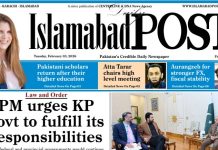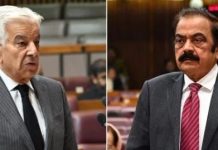ISLAMABAD: Prime Minister Imran Khan said Tuesday in United Nations Development Programme (UNDP) session address that the elite capture is behind the inequality where some people accumulate the wealth they cannot spend in ten lifetimes while the poor suffer.
Citing a fact panel report by United Nations, the PM said every year about $1 trillion leaves developing countries into tax havens or into properties in richer countries, while about $7 trillion are laundered out of poor countries to be parked in safe havens.
“This is one fact behind the huge inequality in the world,” said PM Khan. The poor nations not only are deprived by the employment this money could create; not only does it create poverty because this money could be spent on human development,” he said and added that this theft also affects the currency of the nations where it is being robbed from as so many dollars fleeing the country renders the exchange vulnerable.
The devaluation of the currency due to money laundering by the filthy rich consequently causes more poverty in the country by causing inflation, he said.
“It is a vicious cycle going on and really unless something is done about it, I am afraid the richer countries will have to build walls
around to keep emigrants out – trying desperately to get to the richer countries.”
It is one factor, in my opinion, said the PM, which is causing more deaths in this world due to misery and poverty. “There is no incentive in the rich countries to stop this outflow from the poor countries of the illicit money because they gain from it.”
“We are going to speak to IMF because we see disruptions ahead. Just when our economy was recovering and all the indicators were positive, unfortunately we will have to review the whole situation and our new Ehsaas Program. Because the service industry has been badly hit everywhere in the world but in Pakistan our service industry has been really badly hit,” the prime minister said.
The prime minister said Pakistan was having a very scary third wave than the first one. He said in the United States with a population of 330 million, around $4 trillion were given out to COVID-hit people contrary to Pakistan which distributed just $8 billion among a population of 220 million dollar.
“So I think, this is time for second package and we will obviously talk to IMF,” the prime minister said. Referring to her statement, the prime minister observed that the IMF head realized the seriousness of the situation as conditions could not be imposed on the people already suffering owing to the pandemic.
The report, presented by the lead author Dr. Hafiz Pasha, explores the many dimensions of inequality in Pakistan. These dimensions have been captured both at the national and provincial levels, exploring inequality between and within Pakistan’s provinces. In addition, inequality has been measured from the perspective of people focusing on children, labour, youth, and women. The report takes a comprehensive approach, exploring not just economic measures such as income and wealth, but also studying inequalities in human development –the true measure of a country’s success.
Earlier, Special Assistant to Prime Minister (SAPM) on Climate Change Malik Amin Aslam said that the present government was taking all-out measures to mitigate adverse impacts of climate change-caused disasters on mountain communities in the country’s north.

















